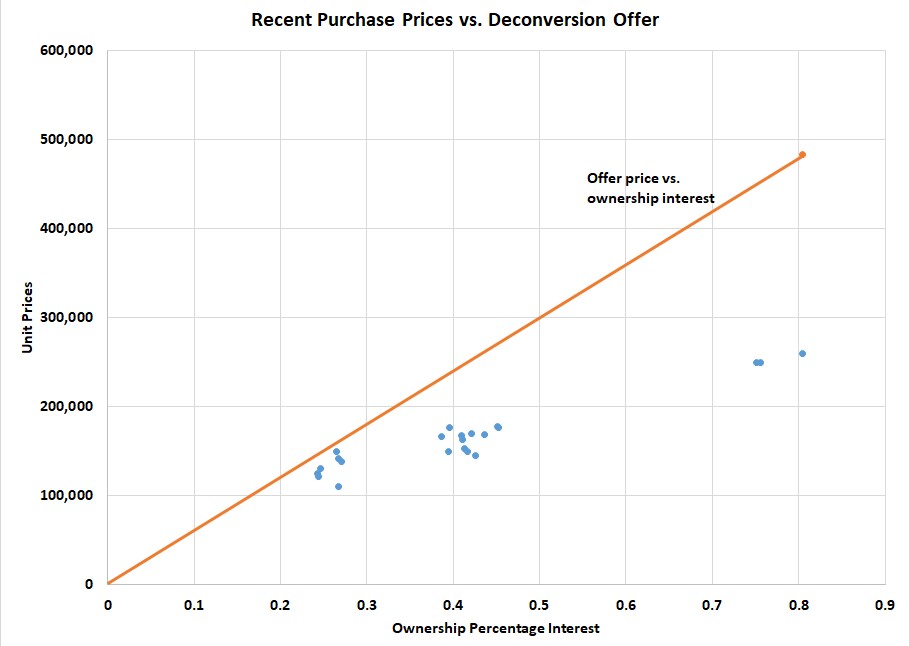About a year ago I wrote about the Chicago condo deconversion boom and how these deals are not necessarily good for all owners. The developer puts an offer out for the entire building and that offer is allocated among the units based upon their ownership interest, which is often largely determined by square footage and possibly other factors such as features or floor level. That formula seems fair but it does not necessarily correspond in any way to market values, which would also reflect the level of finishes in a unit. Things get really nasty if someone recently bought a unit for more than their share of the offer price.
I recently got my hands on one of these offers and it shows just how the incentives align for different types of owners. In the graph below I plotted all the building sales for the 24 month period prior to the offer: sales prices vs. ownership interest %. Each blue dot is a unit sale. Then I drew an orange line that represents the developer’s offer as a straight dollar amount X the ownership interest. The vertical distance between the orange line and any point is the gain that the owner would realize from their sale to the developer.
There are a couple of interesting observations that emerge from this graph. The blue dots all sorta kinda fall along their own straight line but that line crosses the Y axis around $67,000. That’s known as the Y intercept and it means that if there were a unit with zero ownership interest it would have a market value around $67,000, which basically represents the value of living in the building above and beyond the value of the unit itself. It makes perfect sense actually.
But that relationship also means that the smaller units are much closer to the orange line than the larger units – i.e. there is very little financial incentive for them to approve the deconversion. On the other hand the owner of the highest ownership unit purchased in the prior two year period stood to gain $223K.
Even at the low end of the distribution the incentives differ for different owners. You’ve got two owners that bought units with similar ownership interests but one paid $40,000 more for their unit than the other. The difference between the two units was that the cheaper one was a studio in terrible condition with no appliances, no flooring, and the original bathroom and remnants of the kitchen. It was also underpriced as evidenced by the significant premium to list price that it sold for. But the realtor still got to brag about how they sold it above list.
The more expensive unit was well presented by the realtor and had a separate bedroom. The kitchen and bath had been updated probably 15 – 20 years ago. As I originally posted on this topic the owners with units in good condition benefit the least from these deconversions.
Theoretically you could have a situation where a building got caught up in the bubble and never fully recovered. In that case you might have owners that paid prices still higher than today’s market and the buyout offer. But that does not seem to be the case in this building. Almost every unit owner would have made some money on the buyout. Yet a building survey indicated that the buyout proposal would not pass a formal vote so the proposal was rejected.
It’s not clear why the offer wasn’t appealing. It’s possible that people had rational reasons for their lack of interest. Maybe the premium offered wasn’t large enough to offset the hassle of moving for enough people but it looked pretty good to me. A large number of them could have taken the proceeds from the deconversion and bought similar properties with cash left over – or bought nicer properties. The fact is that people are rarely rational when it comes to real estate and it’s more likely that they didn’t understand the economics of the deal. Or maybe they figured that if someone was offering them this deal there must be a catch and they weren’t going to be taken advantage of. And they were wrong.
#Deconversions #Condos #ChicagoCondos
Gary Lucido is the President of Lucid Realty, the Chicago area’s full service real estate brokerage that offers home buyer rebates and discount commissions. If you want to keep up to date on the Chicago real estate market or get an insider’s view of the seamy underbelly of the real estate industry you can Subscribe to Getting Real by Email using the form below. Please be sure to verify your email address when you receive the verification notice.

